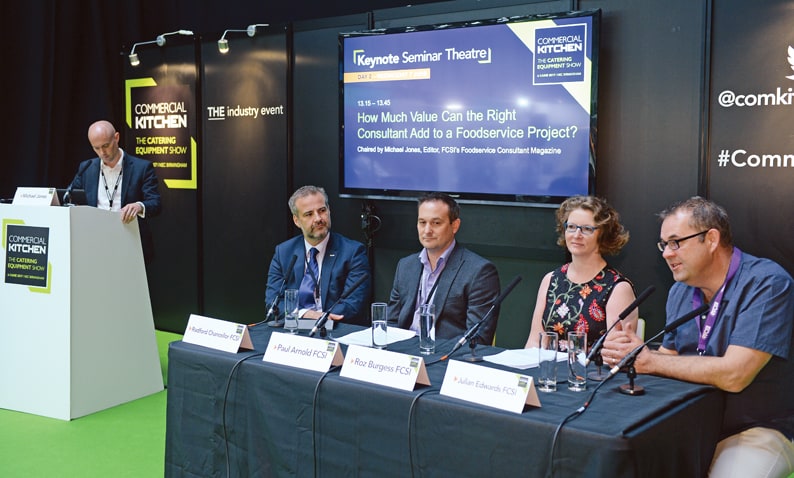
The second Commercial Kitchen Show saw hundreds of visitors attend the NEC in Birmingham, UK. Sitting alongside the 80 exhibitor stalls was a packed programme in the seminar theatre. As part of these Michael Jones, the editor of Foodservice Consultant magazine, hosted a panel of FCSI consultants who discussed the role that they play in a foodservice project.
The panel was made up of Julian Edwards FCSI, director of GY5 and the chair of FCSI UK & Ireland; Roz Burgess FCSI, owner of Intelligent Catering Limited; Paul Arnold FCSI, project director of Tricon Foodservice Consultants; and Radford Chancellor FCSI, director of Radford Chancellor.
Between them they have decades of experience working across the sector, in design as well as management consultancy. They have worked on projects as varied as local government and schools and been involved in diverse undertakings, from hotels in the Middle East to Goodwood in the UK. Their expertise covers hospitality, education, hotels and transport hubs to name a few.
Brought together to discuss the value that a foodservice consultant can bring to a project the panellists highlighted insight above all the insight. “It’s about independent advice,” said Chancellor. “The consultant is a third party for the client, somebody who can monitor cost control – we know where the market is and can give them that insight – but it is often also our role to manage the client’s expectations, which can be unrealistic.”
Commercial value
At the heart of the job is the financials, suggested Burgess. “We are here to bring commercial value,” she said. “We are essentially an extension of the client and we need to help them make clever decisions.”
But Burgess also pointed out that the remit of a foodservice consultant goes beyond the kitchen. “There’s a lot that goes into the building infrastructure that we are involved in,” she explained. “It’s like employing an architect to design a building.”
The earlier a consultant can get involved in a project, the better. Edwards said whenever he works on a new build he asks the same series of questions at the earliest possible opportunity. “I’ll always ask them questions like, ‘have you allowed enough space for that large kitchen block?’, ‘are your ceilings high enough to allow a lot of extraction?,” he explains. “You have to ask them: is there a lift, can you get kit through the door, is there a route for ventilation.” Clearly, he concluded, this is much easier if the consultant is involved from the outset.
There was agreement that there is a job to do when getting the message out about the consultant’s role and also spell out the value of bringing an experienced consultant onboard. It might appear a costly expense but Edwards said the value is long-term. “Spending a few thousand pounds on a top-end consultant does save a lot of money. I am an expense on paper, but in the longer term you will see a better return,” he said. “Clients save a fortune in time but also in specifying the right kit. Manufacturers don’t make things quite as robust these days so we can help with bringing in equipment that will last.”
Youth and diversity
There is a shared responsibility among consultants, to improve messaging and marketing, said Chancellor. This effort is partly required to ensure that there is a continued flow of consultants and the panel agreed that youth and diversity should be addressed within the profession. “We are a heavily male dominated sector and we do need to invite people in through programmes like apprenticeships,” said Chancellor. “Social media plays a part in this but we should also be going into schools and colleges to speak young people about our profession.”
It is a pertinent message these days when faced with competition from third party suppliers who often offer design advice at no cost. But as Burgess said, there is no such thing as a free lunch. “Design can be really creative but it is not enough now. Nobody wants to look into the dish washing area or hear the background noise of the ice machine – it is much more than design, it is the whole picture and only a qualified and experienced consultant can do this.”
Alongside with getting the message about what a consultant does out there sits the issue of misconceptions about the role.
“We get challenged over our independence and how we work with suppliers,” said Arnold. “But we are solution providers so what we look for is USPs that solve a particular problem.” When looking for these solutions it is with a focus on the future and service providers’s assistance after installation is crucial. “It is about how quickly kit gets fixed when things go wrong. Lots of good kit has been undone by bad service providers,” said Arnold.
Among the challenges faced by the profession the panel highlighted the issue of space available in kitchens, an ever increasing load of regulations to comply with as well as resources and recruitment.
Summing up the role of the foodservice Consultants, Edwards said he considered the role to be as a bit of a comfort blanket, helping to allay worries and deal with practical issues. “We deal with environmental health officers and sort out problems too,” he said. “We are a technical resource but we help with everything from food safety to obesity advice.”
Elsewhere, the show saw ten exhibitors named in the Innovation Challenge Awards. They were judged by a panel including FCSI’s Julian Edwards and James Douglas, co-founder of Red’s True Barbecue.
The full results are:
Gold
The ‘Ready’: Carpigiani UK
CS FlashGRILL: MCS Technical Products
UPster rack transport dishwashers: Meiko UK
RATIONAL SelfCookingCenter XS: Rational UK
Silver
APICBASE NV: APICBASE
Let’s Cook Cloud Solution: Middleby UK
Garbage Guzzler: PKL Group (UK)
Reco-Air: Reco-Air
Bronze
Retigo Vision: Retigo
True’s New Refrigerated Prep Table: True Refrigeration
Tina Nielsen

